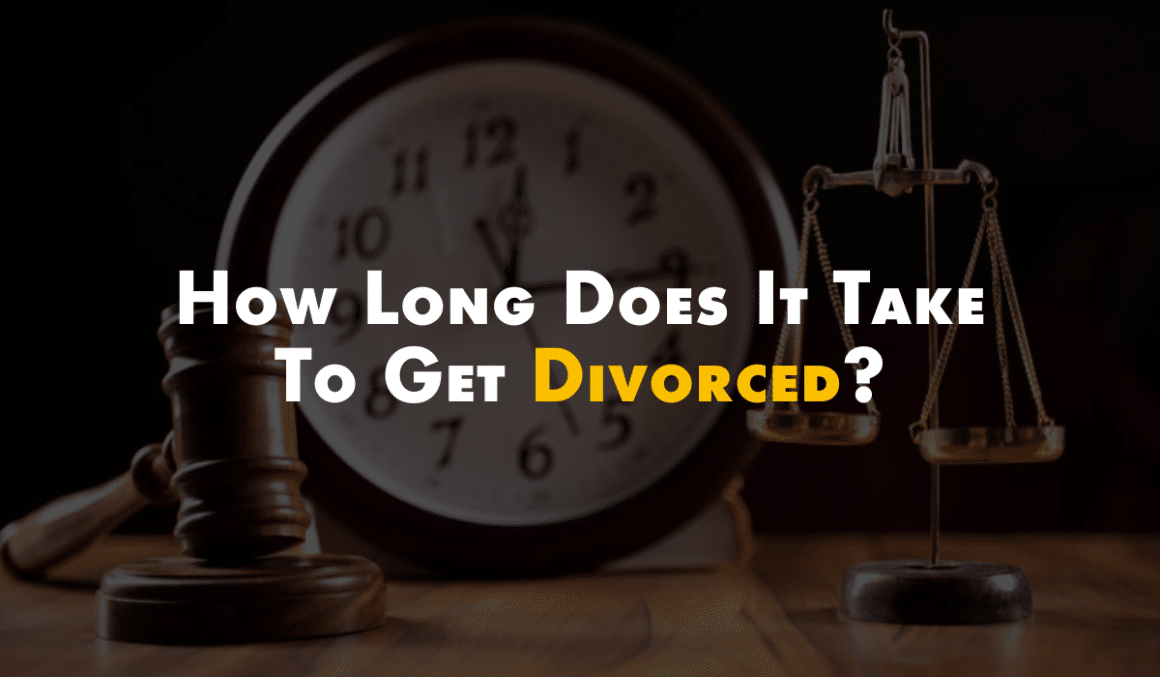Explore the chronology of divorce cases, ranging from quick separations to prolonged legal disputes, and acquire insights on gracefully managing this transformative process.
Divorce is a significant life event that can mark the beginning of a new chapter. Yet, the question of “how long does it take to get divorced” often looms large, creating uncertainty and stress. Understanding the timeline of divorce proceedings can help individuals navigate this challenging journey with clarity and preparedness.
Different factors contribute to the duration of a divorce, making the process unpredictable. Some separations may be resolved quickly, with minimal conflicts and smooth negotiations. In contrast, others might become prolonged battles entangled in legal complexities and emotional turbulence.
State laws, the complexity of assets and property division, child custody arrangements, and the willingness of both parties to cooperate all play crucial roles in determining the length of a divorce.
Exploring divorce timelines can provide valuable insights into the legal system’s intricacies and the potential roadblocks one might encounter. In this article, we will explore how long does it take to get divorced and other essential details.
A divorce is when two people in a marriage mutually decide to end their marriage, but the question they often have in mind during this is: how long does it take to get divorced? so they can plan out the next phase of their lives? The divorce process varies with different circumstances. In this article, we will explore.
- Filing the petition (1-2 weeks)
- Serving the papers (2-3 weeks)
- Response time (2-4 weeks)
- Temporary orders (2-4 months)
- Negotiations or mediation (2-6 months)
- Court filings (1-2 months)
- Court hearings (1-3 months)
- Final judgment (2-3 months)
- Division of assets and debts (1-6 months)
- Custody and support issues (1-6 months)
- Waiting period (varies by location)
- Obtaining the divorce decree (1-2 months)
Filing the petition ( 1-2 weeks )
The divorce process typically starts when one spouse (the petitioner) files a divorce petition with the local court. This can take a week or two to prepare and submit.
Response time (2-4 weeks)
The respondent has a specific period (usually 20-30 days) to respond to the petition. If they agree to the divorce and its terms, the process can move more swiftly.
Temporary orders (2-4 months)
If there are disputes over child custody, spousal support, or property division, temporary orders may be necessary. This phase can take a few months.
Negotiations or mediation (2-6 months)
The next step often involves negotiating the terms of the divorce. Mediation can be a helpful option to resolve disagreements and can add a few months to the timeline.
Court filings (1-2 months)
Once the parties agree on the terms, the legal documents, such as the settlement agreement and parenting plan, are prepared and filed with the court. This step can take one to two months.
Court hearings (1-3 months)
The court schedules hearings to review the divorce agreement and make it official. The timing depends on the court’s docket and can vary.
Final judgment (2-3 months)
After the court approves the agreement, it issues a final judgment of divorce. This can take a couple of months.
Division of assets and debts (1-6 months)
If there are complex financial issues, like the sale of property or the division of debts, it can extend the process. This phase varies widely.
Custody and support issues (1-6 months)
For couples with children, resolving custody and support matters may take several months if there are disputes.
Waiting period (varies by location)
Some jurisdictions have mandatory waiting periods before a divorce is finalized. This can add extra time.
Obtaining the divorce decree ( 1-2 months)
Once the waiting period is over, the court issues the divorce decree. This may take one to two months.
It’s important to note that the total time to get divorced can range from several months to over a year, or even longer for complicated cases. The uncontested divorces, where both parties agree on all aspects and cooperate, tend to be faster. In contrast, contested divorces, with disagreements over finances, custody, or other issues, can significantly prolong the process.
Keep in mind that divorce timelines can vary from place to place, and individual circumstances play a vital role. Consulting with a local attorney is essential for a more accurate estimate of how long it might take to get divorced in your specific situation.
Divorce timelines: How long does it take to get divorced in your state?
The time it takes to get a divorce can vary depending on the state and individual circumstances. In this article, we will answer the following questions.
- How long does it take to get divorced in Colorado?
- How long does it take to get divorced in Virginia?
- How long does it take to get divorced in Florida?
- How long does it take to get divorced in Texas?
- How long does it take to get divorced in California?
- How long does it take to get divorced in North Carolina?
- How long does it take to get divorced in Pennsylvania?
- How long does it take to get divorced in Illinois?
- How long does it take to get divorced in Louisiana?
Colorado: If both parties agree, divorce takes 90 days due to a waiting period, but it can be longer if disagreements arise.
Virginia : Separation for 6 months (no children) or a year (with children) is required before divorce, followed by additional months based on case complexity and court schedule.
Florida: Uncontested divorce takes 3-4 months, but contested ones can stretch to a year or more, depending on the issues.
Texas: Minimum 60 days for divorce, but the actual duration depends on court scheduling and any disputes to resolve.
California: 6 months minimum after serving the divorce petition, and additional time based on court availability and contested matters.
Ohio: Divorce finalization takes 30-90 days. Duration depends on court processing and agreement status between spouses.
North Carolina: One-year separation requirement for no-fault divorces, followed by a few months for the court process based on complexity and availability.
Pennsylvania: Uncontested divorce wraps up in 4-5 months, while contested ones take longer, depending on the specific issues.
Illinois: The uncontested waiting period is 6 months, while contested cases may extend based on complexity.
Louisiana: Uncontested divorce necessitates 180 days, subject to court schedule and any disputes to settle.
Navigating the timeline of divorce
The timeline varies and depends on various factors. We will explore the following:
- How long does it take to be served divorce papers?
- How long does it take to get money from a 401(k) after a divorce?
- How long does the average divorce take?
Service of divorce papers
Serving divorce papers typically occurs within a few weeks to a few months after filing for divorce. The exact timing varies by location and how quickly the court processes the paperwork. The serving process involves delivering the divorce papers to your spouse, ensuring they are aware of the legal proceedings. It’s a crucial step to officially begin the divorce process.
Accessing 401(k) funds after divorce
Accessing money from a 401(k) after a divorce depends on the court’s orders and the plan administrator’s procedures. If the court approves a Qualified Domestic Relations Order (QDRO), it may take a few months to process.
Once approved, the plan administrator can distribute the funds to the ex-spouse, which can take several weeks to a few months. However, there may be penalties and taxes if the funds are withdrawn before retirement age.
The average duration of a divorce
The average divorce timeline varies widely but typically falls between six months to a year. An uncontested divorce where both spouses agree on key issues tends to be quicker, often closer to the six-month mark.
In contrast, contested divorces, where disputes require court resolution, may take a year or more. Complexity, legal requirements, court availability, and the level of cooperation between the spouses can all influence the duration. It’s essential to consult an attorney to navigate the process efficiently and ensure your rights and interests are protected.
Avoiding lengthy legal battles:10 Tips for a swift divorce
Here are 10 tips to avoid longer divorce proceedings
Open communication
- Do: Keep the lines of communication open with your spouse. Discuss concerns and issues honestly.
- Don’t: Use communication as a battleground for arguments or avoid important discussions.
Consider mediation
- Do: Explore mediation as an option to resolve conflicts and make decisions outside of court.
- Don’t: Rush into litigation without considering alternative dispute resolution methods.
Be cooperative
- Do: Work together to find common ground and reach agreements on key issues like property and child custody.
- Don’t: Take a confrontational stance, which can prolong legal battles.
Full disclosure
- Do: Provide all necessary financial information to your attorney and the court, ensuring transparency.
- Don’t: Conceal assets or withhold financial details, which can lead to prolonged investigations.
Consult with experts
- Do: Seek advice from professionals such as financial experts or child specialists when needed to make informed decisions.
- Don’t: Rely solely on your own judgment, especially in complex financial or custody matters.
Keep emotions in check
- Do: Manage your emotions and focus on practical solutions. Emotional reactions can escalate conflicts.
- Don’t: Let anger or frustration guide your decisions.
Parenting plan
- Do: Develop a comprehensive parenting plan that considers the best interests of your children.
- Don’t: Engage in child custody battles without considering the impact on your kids.
Timely documentation
- Do: Keep records of all communication, agreements, and relevant documents related to the divorce.
- Don’t: Neglect to document important interactions or agreements.
Stay informed
- Do: Stay informed about the divorce process and legal requirements in your jurisdiction.
- Don’t: Be unaware of the steps involved, which can lead to delays.
Set realistic expectations
- Do: Have realistic expectations about the outcome of the divorce and the time it may take.
- Don’t: Expect immediate resolutions or an outcome that may not be legally feasible.
FAQs:
How can a lawyer speed up the divorce process?
Lawyers know how to navigate the divorce process due to their vast experience so before you decide to end the marriage. It’s a good idea to meet a lawyer first who will advise you according to your situation. and speed up the entire divorce process.
How can legal representation affect the timeline?
Having legal representation can expedite the process by ensuring all paperwork is correctly filed and that the legal requirements are met. It can help avoid unnecessary delays.
Do uncontested divorces always proceed faster than contested ones?
Generally, uncontested divorces tend to be quicker because both parties agree on key issues. However, the timeline can still be affected by legal requirements and court availability.
Are there options for reducing divorce costs and time?
Collaborative divorce and mediation are alternatives that can help reduce costs and expedite the process, as they encourage cooperation and compromise.
Conclusion
Ending a marriage is a journey, and the duration of this process can fluctuate, influenced by unique circumstances. , uncontested divorces, when both parties agree on major issues, can typically wrap up within a few months. However, if disagreements arise over matters like property division or child custody, the process might extend to a year or more.
It’s important to approach this sensitive phase with guidance from legal experts, considering regional laws and requirements. Patience and understanding of the complexities involved can ease the strain, facilitating a smoother transition for all parties involved.




